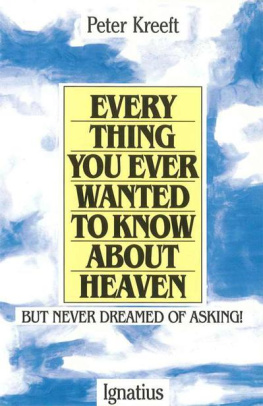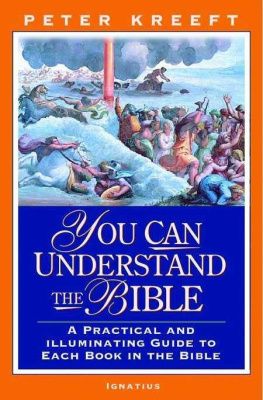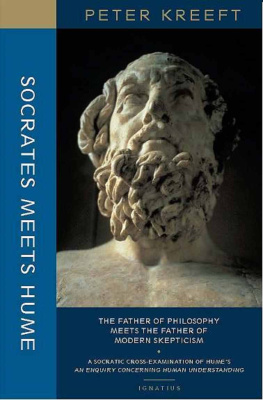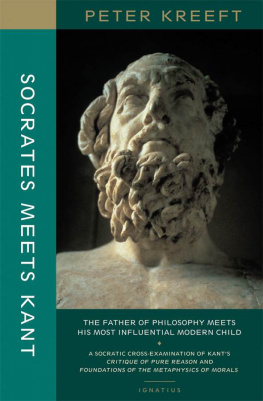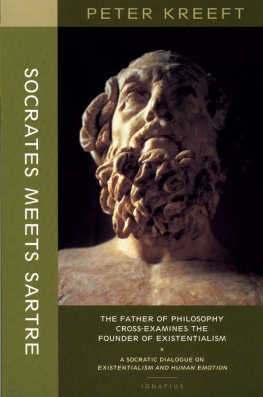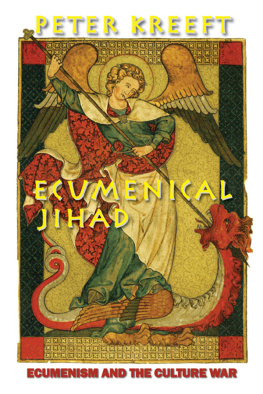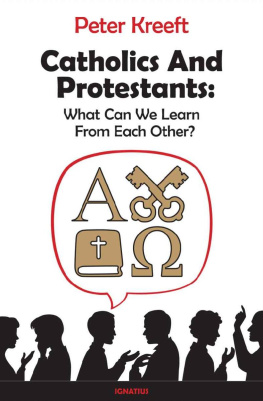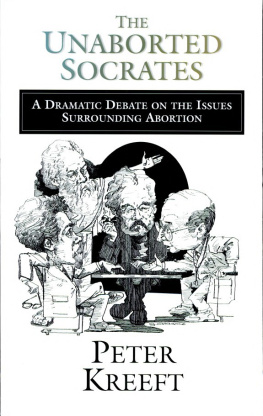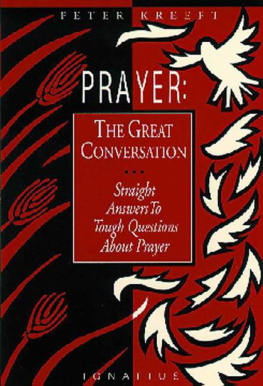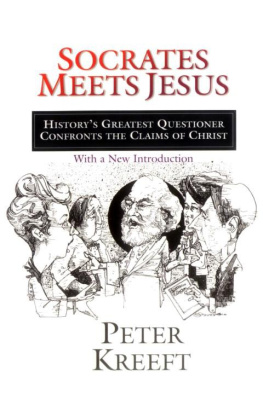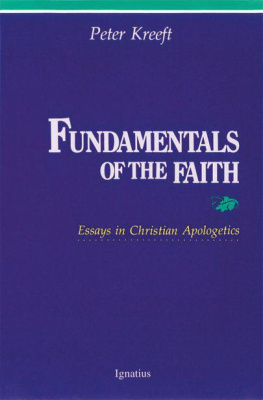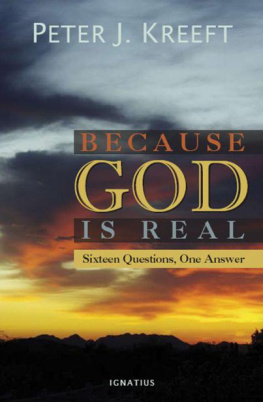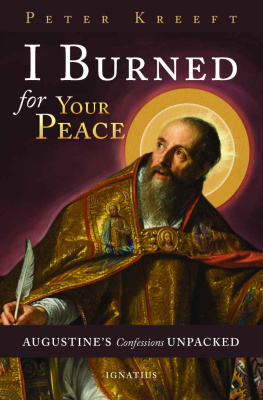1

On Comparative Religions
I t was Tuesday evening and time for my World Religions class. There were twenty-four students, half of them adults and half of college age, with a good ethnic mixture. Two students sat together in the middle of the front row: Isa, a Muslim, and Zvi, a Jew with a black beard, dreadlocks and a yarmulke. These two asked most of the hard questions and made most of the trouble, and I loved them for it. The other twenty-two were all Catholics, in varying degrees of assent or dissent. ( Dissent is the nice, new word for what they used to call heresy.)
Isa and Zvi had become good friends because they were good enemies, constantly arguing about Zionism and Palestine and the PLO. They were like spouses, arguing and then reconciling and then arguing again.
I think Isas first impression of me was that I was a bit wimpy, because I played Socrates and asked questions rather than giving answers. I took both sides of every issue to deliberately confuse the students and force them to think for themselves. But Isa stayed with the class because (as he told me later), On every issue I heard two opposite arguments come out of your mouth, but I also saw a single passion for truth in your eyes.
One Tuesday evening, the class was beginning their twenty-minute break in the middle of the long, three-hour class, and most of the students were staying in their seats, some munching snacks and drinking sodas. This was a time for more informal conversations. Suddenly, Zvi asked me, pointing behind my chair, What is that cross on the wall behind you?
I turned around to look. On the pale blue cinder block wall behind my desk, six feet above the floor, there was a foot-high cross of paint that stood out in darker blue. I knew what it meant, and I opened my mouth to answer Zvis question, but the Holy Spirit interrupted me in the form of a friendly, fat Irishman who was sitting next to Zvi, who explained, Oh, thats where the crucifix used to be. They used to have one in every classroom. And then they took them down. And they havent repainted the walls yet.
Zvi turned to him. When did they take them down?
I wondered why he said when instead of why. I soon found out. Just last year, I think, was the answer.
I thought so. It was the Bundy money, said Zvi.
No one understood the reference, and when the class asked him about it, Zvi explained that not long before, President Johnsons secretary of state, McGeorge Bundy, had negotiated a compromise on the divisive issue of federal funding going to religious schools so that the issue would not have to go to the Supreme Court. The compromise was that these schools could get federal grants as long as they were not sectarian and exclusive. What that meant was deliberately left undefined. Zvi pointed out that in the year following this ruling, almost all of the twenty-one Jesuit colleges in America, including Boston College, had taken down their crucifixes from the classrooms.
The Irishman protested this explanation as much too cynical. We wouldnt do that for money .
Zvi replied, with a wicked little grin, Of course not. But I hope you got more than thirty pieces of silver this time. Zvi then had to explain to the biblically illiterate class that Judas Iscariot was the first Catholic to accept a government grant.
No way, protested the Irishman. We did it to be ecumenical.
At this point Isa chimed in. What does that mean, ecumenical? Can you define that term?
He directed the question to me, and once again I opened my mouth to answer, and once again the Holy Spirit interrupted, this time from the mouth of a nursing student in white stockings sitting behind Isa. (I remember both her face and her papers as resembling each other in being overweight and sloppy-looking.) She said something vague like Ecumenical means we reach out to everybody, everybodys welcome here, and we dont want to offend anybody.
Offend anybody? Isa asked sharply. Who? Who did you fear to offend?
The girl was clearly offended by the question. Why, non-Catholics, of course.
You mean people like me? A Muslim? And my friend the Jew?
(My friend the Jew smiled at Isa. They were not enemies now, fighting over Palestine, but common outsiders in Christian America and Catholic Boston College.)
The class hushed, sensing a confrontation. They seemed to be offended by the two impolitely concrete words Muslim and Jew , two of the only words in our language that still have teeth in them.
Yeah, I guess so, the girl replied.
Well, I for one am very much offended, Isa declared. The class hushed even more.
For goodness sake, why? asked a voice from the rear.
Because you have called me a bigot.
No, no, no, we would never do that. We hate bigotry. When did we ever call you a bigot?
When you took down your crucifixes.
Thats ridiculous. We took them down because we hate bigotry. We took them down because we didnt want to look like bigots. Why in the world do you say that was calling you a bigot?
Let me try to explain it to you, answered Isa. Suppose you came to a Muslim country and enrolled in a Muslim university. Would you be offended by the quotations from the Quran in Arabic that you might see on the walls?
Of course not.
And would you be offended by a Star of David if you saw it in a Jewish university?
Of course not.
Why not? Because you are not a bigot. Only a bigot would be offended by a Muslim symbol in a Muslim university, or a Jewish symbol in a Jewish university, right?
Right.
So why did you expect me to be offended by a Catholic symbol in a Catholic university? Only because you expected me to be a bigot. Isa was silent for five seconds to let the logic sink in. Then he drew the logical corollary: And I think thats being a bigot: expecting the other person to be a bigot. So I am offended.
The class just didnt know what to say, or to think. Zvi and I were the only two who were smiling.
Isa didnt let it go at that. He went on. You know, we Muslims dont have statues or pictures of any person, not even the Prophet Muhammad (blessed be his name!) or the prophet Jesus (peace be upon him!). We believe that is forbidden by Gods commandment against making graven images. But if we did have pictures of our prophets, we would never take them downnot for money, not for anything, and certainly not for fear of offending some bigot.
In fact, if we had pictures of our prophets, and soldiers came into our classroom with guns and demanded that we take down the pictures of our prophets because there was a new law and a new regime in power that demanded it, we would never do it. Every good Muslim in that class would run to the pictures and defend them with his life. We believe that martyrs, who die for Allahs honor, will go to Paradise. We would consider it a great privilege to die for the honor of one of our prophets, especially for the Prophet Muhammad (peace be upon him!) or for the Prophet Jesus (blessed be his name!).
Isa had everyones total attention. He was turning around and facing them. He was the teacher now. Tell me, he asked, how many of you are Christians?
Everyones hand went up, except Zvis. So tell me, do you really believe that Jesus is the Son of God? How many of you believe that?
Again twenty-two hands went up, most of them hesitatingly.
Well, we Muslims dont believe that. We believe that that idea is pagan and idolatrous and blasphemous and ridiculous. But we do believe that Jesus was a great prophet, and he spoke the Word of God, and he was virgin born, and he performed miracles, and he even raised the dead, and he will come again to judge the world at the end of time. The Quran says all that about Jesus.
So we revere him and we honor him, and we would never remove his pictures, if we had them, not for money or for fear of offending anyone, not even for fear of death. And you say you believe he is the Son of God, yet you take down your pictures of him just for fear of offending us.



